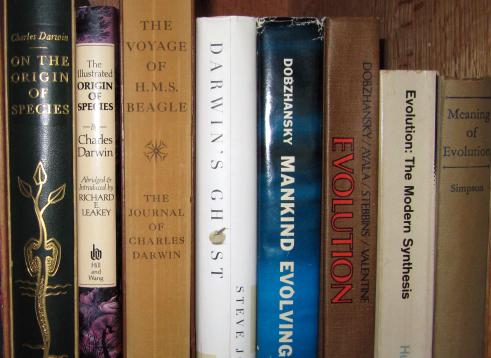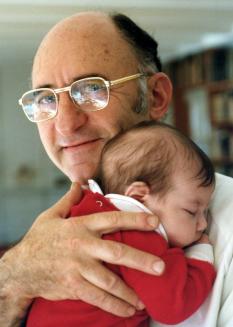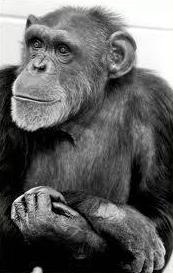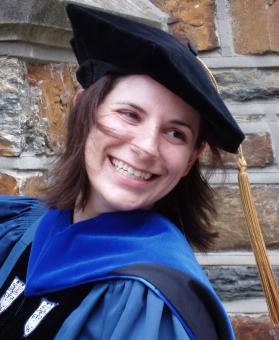
But he remained interested in biology and in science all his life. He taught me a great deal about biology, how to be observant, and about science in general. I've already noted this in my blog entry "Dan and the Moon". He was particularly interested in, and knowledgeable about, Darwin's theory of evolution. He had a great many books on evolution, including several copies of Darwin's famous work On the Origin of Species. He also had several books on primates, particularly the apes, such as gorillas and chimpanzees. Dan was also interested in the theories of Freud, and he was in psychoanalysis for 10 years. He studied the psychological theories of Abraham Maslow, a professor at Brooklyn College, in New York. My mother had studied psychology at Brooklyn College, and I believe she had actually taken a course taught by Maslow. But I got the impression that my father didn't think she had a really deep appreciation of Maslow's research. He applied Maslow's "Dynamic Theory of Human Motivation" to his work as a business manager, writing articles which were printed in business magazines. There was a good deal of open conversation about sex in our family, always using proper scientific terminology. Visitors were occasionally a bit shocked by some of the things which were talked about at our dinner table. Perhaps my father's combined interest in Darwin and Freud was what led to this (or maybe it was the other way around). My father's openness about these matters no doubt resulted in the episode at the summer camp Robinson Crusoe which I described in my blog entry "Sex in the Woods". Note 1 Towards the end of his life, Dan had some articles on psychology and evolution accepted by a few conferences and journals. Note 2 I had a feeling that he somewhat regretted not having been able to lead an academic life. My daughter Elissa, Dan's first grandchild, was always an excellent student. I recall her sopping up French vocabulary like a sponge. She once asked me for help with some mathematical topic she was having trouble with. But by the time I got around to helping her later that evening, she told me that I was no longer needed - she had figured it out on her own.
After Elissa graduated from college, the primatologist Cheryl Knott, of Harvard, offered her the following dream job: she would be in charge of a group of six to eight Indonesian men, somewhere way off in the middle of the jungle. They would track a troop of orangutans, which lived up in the trees. Whenever an orangutan started to urinate, a group of men would run under them with a tarp to catch the urine. This would then be sent back to Harvard for hormonal analysis. Not only did this job not pay anything, but Elissa would have had to pay her own way to Indonesia, since the project was not funded. Elissa declined the position. But I thought to myself, the only other person who might have thought that would be a very interesting thing to do could have been Dan. Note 4
The theory of evolution, of course, is now the cornerstone of modern biology, and Elissa took, and later taught, courses in evolution. In much such research, the role of sexual selection is very important. While visiting some of her graduate student friends on one occasion, I overheard a rather strange discussion of some kind of odd sexual behavior of some animal or other (I forget the details). I commented to my hosts, "Everyday conversation at the BAA", and I thought back to some of the conversations at the dinner table of my youth. At one point during her graduate studies, Elissa had a job working on a project in animal conservation. This led to the bizarre sentence with which she closed an e-mail message one day, "Well, I'm off to electro-ejaculate some Eld's Deer." Since Dan died when Elissa was nine years old, I don't think he directly influenced her in any way. Any such influence came through me, or from Elissa's mother Margie, who was herself a biology major (ask her about antibody production in the mouse spleen). Or perhaps it's just a coincidence. At Harvard University, Elissa is now teaching a course on evolution whose curriculum she wrote. It's called "Darwinian Dating", and it's about the evolution of human attraction. It's a very popular course, and it's occurred to me that perhaps Elissa is living Dan's dream, two generations later. My sisters and I have bequeathed to Elissa all of Dan's books on evolution and primates, only a very small sample of which are shown below:    Note 1: In his book, "Gaily, Gaily" (1969), Ben Hecht reported being sent off, as a young cub reporter, to write an article on a speech given in New York by Sigmund Freud. He returned with a piece that discussed Freud's theories on the Oedipus Complex, among other things. Reading it, Hecht's editor said, "You didn't make this stuff up, did you?". Hecht replied that it was 99 percent exactly what the professor had said. The editor then said something like, "Gosh, imagine someone finding out something new about sex in this day and age." [return to text] Note 2: One of Dan's papers was "The Species-Specific Framework of Man and Its Evolution", in the journal War, its causes and correlates, editor: Martin A. Nettleship, R. Dale Givens, Anderson Nettleship, 1975. Elissa recently obtained a copy from Harvard's Widener Library, call number "TOZ GEN SOC. W 195". [return to text] Note 3: Another chimp at the CHCI, Moja, liked to dress up in different clothes each morning, and then go out and swing in the trees. One day, she decided to put on a red négligée, accented with a pair of combat boots. She then climbed up to the top of her enclosure. This made her visible from a nearby road, where the startling sight caused a multi-car pile-up. [return to text] Note 4:
Cheryl Knott is now at Boston University, and her project did eventually go ahead. You can see a report on it in the Fall 2011 issue of BU's arts&sciences magazine, entitled "Hormone Hunter". It includes the quote, "Her not-so-glamorous role as an 'orangutan pee collector' earned Knott a place in Popular Science's 2005 list of the worst jobs in science." [return to text]
 |


 Elissa continued her education by enrolling in a doctoral program at Duke University, in Durham, North Carolina. There, she specialized in the study of primates, at Duke's school of "
Elissa continued her education by enrolling in a doctoral program at Duke University, in Durham, North Carolina. There, she specialized in the study of primates, at Duke's school of "